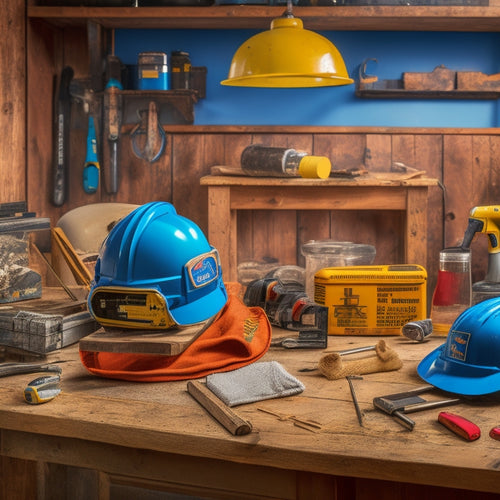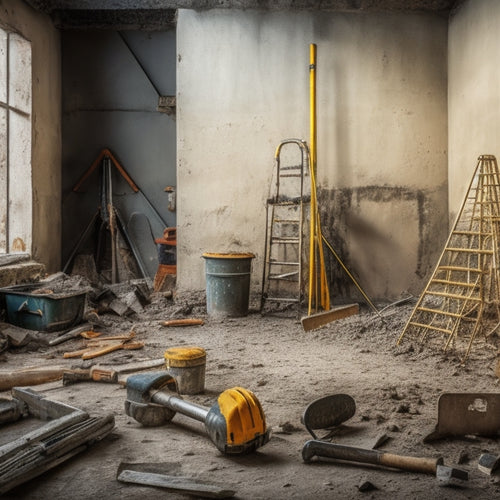
Foundation Repair Tool Rental Options for Home Renovation
Share
When tackling a home renovation project that involves foundation repair, you're likely to need a range of specialized tools. Renting these tools can be a cost-effective solution, saving you up to 50% of your foundation repair costs. You'll have access to equipment like hydraulic block lifters, precision grout pumps, and high-pressure injection pumps for block crack injection. Additionally, you'll be able to rent wall anchor systems, soil stabilization tools, and piering and underpinning equipment. By exploring your rental options, you'll be able to tackle complex foundation issues and get your project back on track - and you're about to discover the precise tools and techniques to make it happen.
Key Takeaways
• Consider renting specialized equipment like hydraulic jacks, piering systems, and compact excavators for foundation repair tasks.
• Block wall straightening equipment rentals can reduce upfront costs and optimize budgets for home renovation projects.
• Rental options for foundation crack injection tools, such as high-pressure injection pumps and mixing systems, are available for efficient repairs.
• Wall anchoring system rentals provide access to anchors, rods, and plates for stabilizing bowed or cracked walls during home renovation.
• Soil stabilization tool rentals, including compaction tools and reinforcement solutions, can help prevent settlement and improve load-bearing capacity.
Block Foundation Repair Tool Rental
When renting tools for block foundation repair, you'll need to focus on equipment capable of handling the unique demands of this type of foundation, including heavy lifting, precise alignment, and thorough grouting.
Block foundation materials require specialized tools to guarantee a secure and durable repair. You'll want to prioritize tools that can efficiently handle heavy concrete blocks, allowing for precise placement and alignment.
To achieve a successful repair, it's crucial to have the right tools for the job. Renting a hydraulic block lifter, for instance, can simplify the process of lifting and placing heavy blocks.
Additionally, a precision grout pump will guarantee thorough grouting, which is critical for maintaining the structural integrity of the foundation. By investing in the right tools, you'll be able to complete the job efficiently and effectively.
Concrete Block Repair Tool Essentials
When tackling concrete block repair, you'll need to focus on three critical areas: block crack injection, wall anchor systems, and mortar joint repointing.
You'll want to make certain you have the right tools for each task, as improper repair can lead to further damage and safety risks.
Block Crack Injection
By injecting epoxy or polyurethane into the cracks, you can effectively restore the structural integrity of damaged concrete blocks. This process, known as crack sealing, is a vital step in block crack injection.
To achieve ideal results, you'll need to select the right injection material for the job. Epoxy injection is ideal for cracks that are 1/16 inch or wider, as it provides exceptional strength and durability. On the other hand, polyurethane foam is better suited for smaller cracks, as it expands to fill voids and provides a watertight seal.
When preparing for block crack injection, make certain to clean the cracks thoroughly to remove any debris or contaminants. Next, drill injection ports at regular intervals along the crack, and then inject the selected material using a high-pressure pump.
As the material flows through the crack, it will fill any voids and restore the block's structural integrity. By following these steps, you'll be able to effectively repair damaged concrete blocks and guarantee a strong, stable foundation for your home renovation project.
Wall Anchor Systems
Set up your wall anchor system to stabilize bowed or cracked walls by driving anchors through the wall and into a stable footing or foundation. This system is essential for concrete block repair, as it provides wall stability by transferring the weight of the wall to a more stable structure.
When installing wall anchors, make certain to identify the correct anchor type and size for your specific wall conditions. You'll need to drill holes through the wall and into the footing or foundation, then drive the anchor into place. To guarantee proper anchor installation, follow the manufacturer's instructions and take necessary safety precautions.
As you install the anchors, make certain to space them correctly to achieve ideal wall stability. The general rule of thumb is to install anchors every six to eight feet, depending on the wall's condition and load-bearing capacity.
Once the anchors are in place, tighten them according to the manufacturer's specifications to guarantee maximum stability. With a properly installed wall anchor system, you can restore your wall's structural integrity and prevent further damage.
Remember to rent the necessary tools and equipment to guarantee a successful anchor installation.
Mortar Joint Repointing
You'll need to remove deteriorated mortar from the joints to prepare for repointing, an essential step in concrete block repair that requires specialized tools and a thorough understanding of the process.
This process involves carefully extracting old mortar, cleaning the joint, and refilling it with new mortar that matches the original in color and composition.
To achieve professional-looking results, you'll need to master various repointing techniques, including:
-
Grinding: Using a grinder or chisel to remove old mortar, taking care not to damage surrounding blocks.
-
Cleaning: Thoroughly removing dust and debris from the joint to guarantee a strong bond between old and new mortar.
-
Matching mortar types: Identifying the original mortar type (e.g., lime-based, cement-based, or epoxy-based) to ensure compatibility and a seamless blend.
Foundation Crack Injection Tools
Effective foundation crack injection relies on the right tools, which enable you to accurately inject epoxy or polyurethane resins into hairline cracks and larger fractures.
With the correct equipment, you can guarantee a successful crack sealing process that restores the structural integrity of your foundation.
When renting tools for foundation crack injection, consider the following essentials. A high-pressure injection pump is necessary for injecting epoxy or polyurethane resins into cracks.
You'll also need injection packs or ports, which are inserted into the cracks to distribute the resin. Additionally, a mixing system for the resin and a cleaning tool for the equipment are essential.
For epoxy injections, a heated hose and gun are required to maintain the ideal temperature for the epoxy.
In addition, safety gear, such as gloves and goggles, is a must to protect yourself from the resin and other hazards.
Block Wall Straightening Equipment
When you're dealing with block wall straightening, you'll need to decide on the best method for your specific repair job.
You'll want to evaluate factors like the severity of the wall's leaning, the type of soil it's built on, and the structural integrity of the surrounding foundation.
Wall Straightening Methods
As you prepare to tackle foundation repair, you'll need to grasp the wall straightening methods that guarantee wall stability and structural integrity. Block wall straightening equipment, such as hydraulic jacks and bracing systems, enables contractors to restore structural integrity by pushing walls back into their original position.
When it comes to straightening walls, you'll need to take into account the following methods:
-
Hydraulic jacking: This method uses hydraulic pressure to slowly and carefully push the wall back into place, allowing for precise control and minimal damage to surrounding structures.
-
Bracing systems: These systems use a combination of beams, brackets, and anchors to stabilize the wall and prevent further movement or collapse.
-
Piering systems: This method involves installing piers under the foundation to lift and stabilize the wall, providing long-term support and stability.
Equipment Rental Benefits
Relying on rented block wall straightening equipment can greatly reduce your upfront costs and optimize your foundation repair project's budget. By choosing to rent instead of buying, you'll avoid the hefty expense of purchasing specialized equipment that may only be used for a single project. This cost savings can be significant, allowing you to reallocate resources to other critical aspects of your renovation.
Moreover, equipment rental provides you with rental flexibility, giving you the freedom to choose the equipment you need, when you need it. This flexibility is particularly valuable when working on complex foundation repair projects that require specific tools for specific tasks.
With rental options, you can select the right equipment for each stage of the project, ensuring that you're always working with the most effective tools for the job. By leveraging rented block wall straightening equipment, you'll be able to tackle your foundation repair project with confidence, knowing that you're working efficiently and effectively.
Piering and Underpinning Tools
You'll need a robust set of piering and underpinning tools to effectively stabilize and lift a foundation, including hydraulic piering systems, steel piers, and compact excavators. These tools are essential for implementing piering techniques and underpinning methods that guarantee a strong and stable foundation.
When it comes to piering, you'll want to utilize tools that allow for precise control and maximum lifting power. This may include:
-
Hydraulic piering systems with adjustable pressure controls
-
Steel piers with high-strength, corrosion-resistant materials
-
Compact excavators with precise digging capabilities
Foundation Leak Detection Tools
After stabilizing the foundation with piering and underpinning tools, you need to locate and address any water leaks that may be contributing to the foundation's instability. This is where foundation leak detection tools come into play. These tools are designed to identify and pinpoint the source of water infiltration, allowing you to take corrective action before further damage occurs.
Leak detection tools typically include equipment such as moisture meters, thermal imaging cameras, and acoustic sensors. Moisture meters measure the moisture levels in walls, floors, and ceilings, helping you identify areas of high moisture that may indicate a leak. Thermal imaging cameras detect temperature anomalies that can indicate water presence, while acoustic sensors listen for the sounds of water flowing through pipes or behind walls.
When renting foundation leak detection tools, verify you have the right equipment for your specific needs. Conduct a thorough moisture assessment to determine the extent of the leak and identify the best course of action.
Wall Anchoring System Rentals
When addressing foundation instability, you'll need to stabilize bowed or cracked walls with a wall anchoring system. This system involves renting specialized equipment designed to tie the wall back to the floor system or adjacent walls.
The wall anchoring system consists of anchors, rods, and plates that work together to redistribute the weight of the wall and prevent further damage.
To guarantee a successful wall anchor installation, you'll need to master certain techniques, including:
-
Properly identifying the best anchor location to maximize stability
-
Effectively drilling into the wall and anchoring system components
-
Applying precise anchor tensioning techniques to achieve the desired level of stability
Soil Stabilization Tool Options
By stabilizing the soil beneath your foundation, you can prevent settlement and cracking, which is why renting the right soil stabilization tools is crucial to a successful foundation repair.
When it comes to soil stabilization, you'll need tools that can effectively compact and reinforce the ground. For soil compaction, consider renting a plate compactor or a roller compactor, which can densify the soil and increase its load-bearing capacity. These tools are especially useful for compacting soil in areas with high water tables or unstable soil conditions.
For ground reinforcement, you may need to rent tools that can install geogrids or geotextiles. Geogrids are mesh-like materials that provide additional strength to the soil, while geotextiles are permeable fabrics that prevent soil erosion and improve drainage.
Advanced Foundation Repair Solutions
In tackling complex foundation issues, you'll often require more sophisticated tools and techniques that go beyond soil stabilization, which is where advanced foundation repair solutions come into play.
These solutions involve specialized equipment and expertise to address deep-seated problems that threaten the structural integrity of your home. When dealing with severe foundation damage, you'll need to employ advanced repair techniques that can restore your home's foundation to its original state.
Some of the advanced foundation stabilization methods you may need to evaluate include:
-
Piering systems: These involve installing deep foundation piers to transfer the weight of your home to more stable soil or rock formations.
-
Wall anchoring systems: These are designed to stabilize and straighten bowed or leaning walls by anchoring them to more stable exterior soil or rock.
-
Grout injection systems: These involve injecting grout into cracks and crevices to fill voids and stabilize the foundation.
Frequently Asked Questions
What Kind of Training Is Provided With Tool Rentals?
When you rent tools, you'll typically receive thorough training on their proper use, including tool safety guidelines. This guarantees you're well-versed in operating the equipment efficiently and safely.
Be sure to review the rental agreements carefully, as they often outline specific training requirements and safety protocols.
Are Tool Rentals Available for DIY Homeowners or Contractors Only?
Can you really put a price on convenience?
When it comes to tool rentals, you're probably wondering if they're only available to contractors or if DIY homeowners like you can get in on the action too.
The good news is that many rental companies cater to both, offering homeowner benefits like cost-effective solutions and contractor flexibility with customizable rental periods.
Can I Rent Tools for a Partial Day or Only Full Days?
When it comes to tool rentals, you're probably wondering if you can rent for a partial day or only full days. The answer lies in the rental policies.
Typically, rental companies offer full-day rentals, but some may provide partial day rentals, usually in half-day or quarter-day increments.
You'll need to check the rental company's policy to see what options are available. Be sure to ask about their flexible rental periods to guarantee you're getting the best deal for your project's specific needs.
Are Rental Tools Guaranteed to Be in Good Working Condition?
You expect rental tools to be in top shape, and rightly so.
Reputable rental companies prioritize tool maintenance to guarantee equipment is in good working condition. Their rental policies typically include regular inspections, servicing, and calibration to prevent malfunctions.
Before renting, review the company's maintenance protocols and ask about their quality control processes. This assures you'll receive reliable tools that meet industry standards, saving you time and hassle on your project.
Is On-Site Tool Delivery and Pickup Available for an Extra Fee?
When you're planning a project, you'll want to evaluate delivery options that save you time and hassle.
Yes, on-site tool delivery and pickup are available for an extra fee, which varies depending on your location and rental duration.
This convenience can be factored into your overall rental fees, ensuring you receive the tools you need without delay.
Conclusion
As you stand back to admire your newly restored foundation, remember that a strong base is like a sturdy anchor, holding fast against life's turbulent seas.
Just as a ship can't sail without a secure mooring, your home can't weather the test of time without a solid foundation.
With the right tools and expertise, you've secured your anchor, ensuring your home remains a safe haven for years to come.
Related Posts
-

Affordable Plastering Tools for Home Renovation Success
You're taking the first step towards a successful home renovation by investing in the right plastering tools. Start w...
-

Top 3 Safety Essentials for DIY Renovations
When tackling a DIY renovation, you'll want to prioritize three essential safety items to protect yourself from poten...
-

What Tools to Rent for Block Wall Renovation
When renovating a block wall, it's vital to have the right tools for the job. You'll need demolition tools like pry b...


